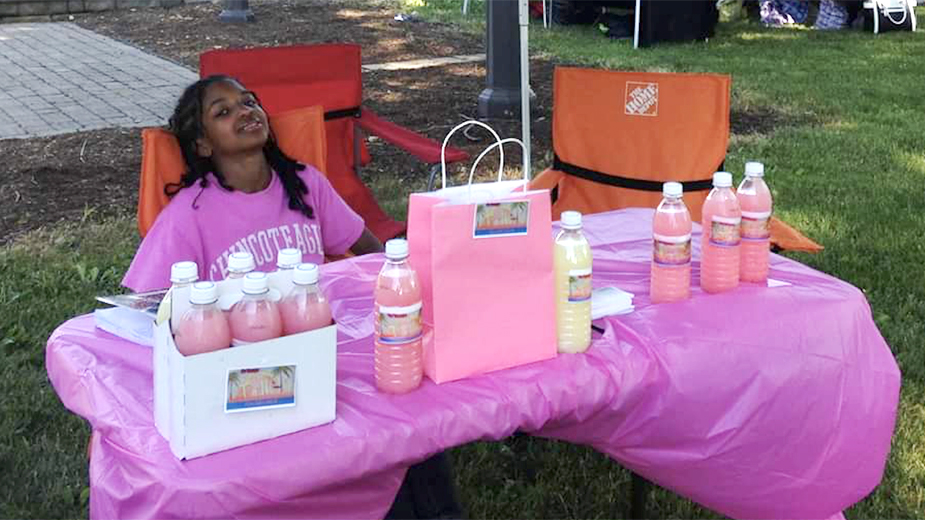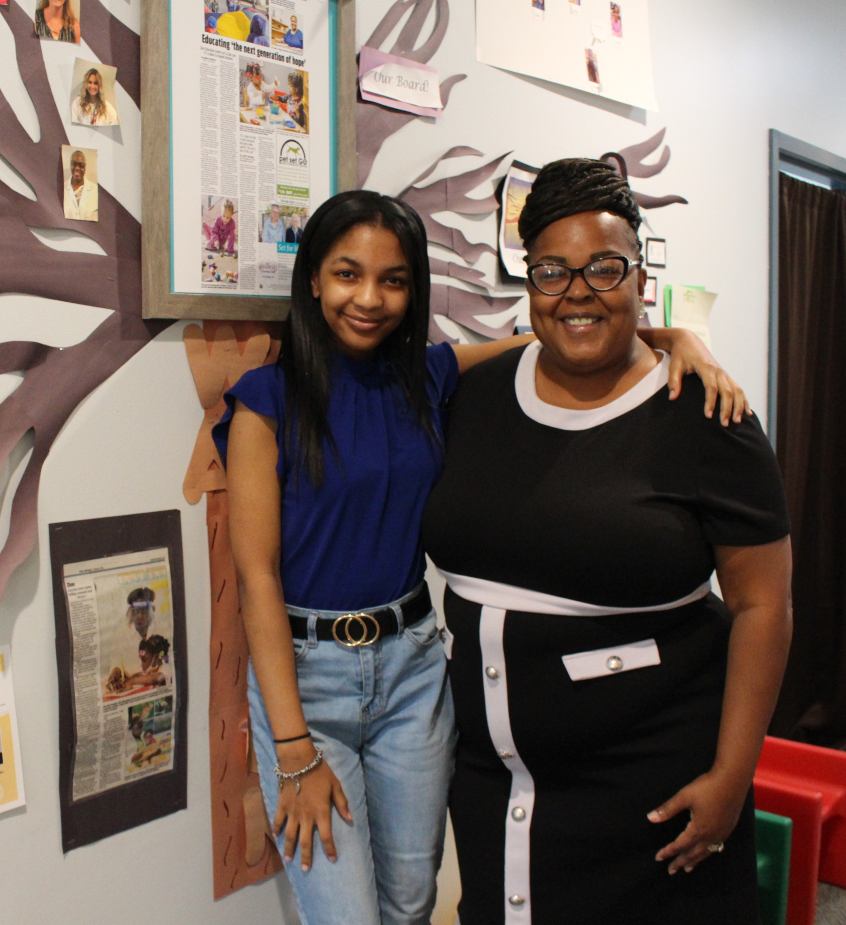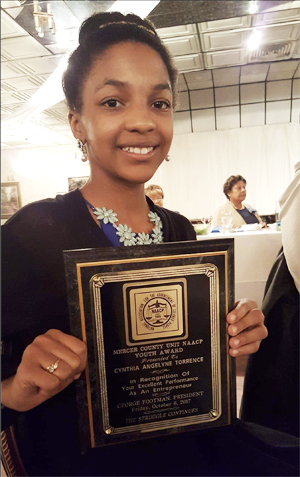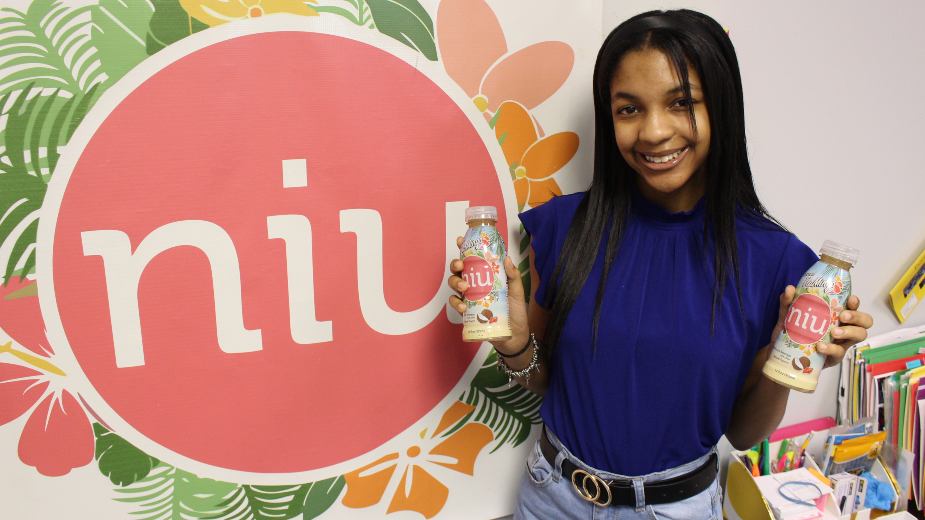HERMITAGE, Pa. — Beginning a brand from scratch and gaining national distribution is a challenge for anyone. Imagine doing it at age 16.
That’s the success story of Cynthia Torrence, who is looking to see sales of Niu grow. Niu is a low-sugar juice drink consumers already are buying online from as far away as Los Angeles. What began about nine years ago in her home kitchen with her mother, April, has developed into a family business that Torrence manages as CEO while beginning her junior year at Hickory High School in Hermitage, Pa.
Niu was invented during a church fundraiser when Torrence was in first grade. She set up a lemonade stand and sold regular lemonade as well as the first iteration of Niu’s Tropical FlaMingo flavor.
She received positive feedback from churchgoers, including the pastor, who asked if Torrence could come up with a more diabetes-friendly version of the drink. April Torrence did some research and discovered better ingredients to use. Today, the coconut water-based beverage is sweetened with stevia leaves, strawberries, pineapples, apples and lemons, according to its description on Amazon.com.
For the first four years, Cynthia produced and bottled Niu out of the family home. In 2016, she was invited to the eCenter@LindenPointe business incubator, where she took business classes and became its youngest entrepreneur. One of the biggest takeaways from the incubator, she says, is developing social skills.
“I’m a very socially awkward person. They were inviting me to all these events and I had to talk to all these older people,” she says. “I don’t have a problem with talking to older people; but I was nerve-wracked. I was only 12 or 13 at the time.”

She also learned how to network and market her business. Now she can build her own websites and manage her social media accounts. The eCenter also connected Cynthia with Metabrand, a New Jersey-based food and beverage consulting firm that now produces Niu on a larger scale. She describes taking that step onto a more national platform as “insane.”
At first, Cynthia admits, she was skeptical that another company could replicate the flavor. After 18 trials, they arrived at a formulation they were happy with.
“When that first truckload of 300 cases arrived last summer, I was like ‘Wow. This is really happening,’ ” she says. “I knew it was in the works. But to actually see it like that and then start delivering to all these different stores – and then ending up on Amazon, it was like this huge step with everything. It was surreal.”
With her side hobby now a growing business, she had to find ways to balance her responsibilities to the company with school and being a teenager.
She found ways to work around the eight hours at school, she says. This year, she opted for remote learning during the coronavirus pandemic, which affords her a little more free time during the school day.
With Metabrand in the picture, she no longer has to produce the drink in her kitchen, which gives her more time to develop her social media presence and to market Niu, she says.
“Everyone time-manages a different way,” she says. “But I ended up just kind of taking different pieces out of my schedule and trying to fit them together into what I’m doing every day.”
Niu is one-third of Talls LLC, which stands for Torrence Avery Lemonade Logistics Scholastic. The family-owned LLC includes Zion Education Center Inc., in Farrell, which April Torrence operates, and a steel-hauling company operated by April’s husband, Kelvin. He typically hauls pipe from Wheatland Tube and Sharon Tube. April Torrence is chief financial officer of Talls.
Having all three businesses under one LLC creates a “healthy economic balance,” April Torrence says, because if one organization isn’t performing well, the others can make up the slack. This year, the coronavirus pandemic had a major impact on the company, particularly on Niu, which saw a 65% decrease in revenue.

In response, the company ramped up social media marketing and initially tried to ship from the Torrence home. Mass shipping options were tried over a 30-day period “just to beat the deadline before the product expired,” she says, which created a “huge rush” in March. In April and May, shipping was “pretty much dead.
“We started out in the summer of 2019, I want to say in 18 different locations,” April Torrence says. “And when a lot of those locations closed down in March, April and May of 2020, we had to resort to Amazon.”
While the company has to contend with Amazon’s fees, which eat into half of its profits, “It does give us the opportunity to reach customers globally. And we have some on the West Coast as well and all down the East Coast,” she says. The company is researching other local shipping options, she adds.
The pandemic affected Kelvin’s steel-hauling business as well, he notes. He had plans to buy new equipment this year. But the pandemic forced him to hold off.
Because of the nature of the steel industry, business fluctuates, he says. Depending on who’s buying pipe, Kelvin can see 26 to 30 loads in two weeks, he says. And while some days are slammed, on others he gets only one load, he says.
“If I can get five a day, I’m good,” he says.
Loans and grants through the Small Business Administration helped to offset expenses during the pandemic, including a $10,000 Paypal Empowerment Grant to Niu, which will allow the company to introduce a second flavor by fall – Berry Blast.
Metabrand is working on its initial formulations. There are two more flavors the company looks to have on the market by the time Cynthia enters college.
Her mother has always been interested in entrepreneurship. It was important to her to instill and encourage that in her children, April Torrence says.
“I’m that person who believes that everyone has a business inside of them,” she says. “And whether it’s selling a tropical drink or making masks or doing floral arrangements, everyone has this special niche or special gift. Most people just do it for the fun of it when you can do it to turn a profit and still have fun.”

Kelvin Torrence agrees, saying there are opportunities for anyone who puts in the work.
“We’re trying to show other young people that you can do something with your life if you apply yourself and have good family support,” he says.
For Cynthia, being a young entrepreneur has numerous benefits, particularly because of the skills she’s developed before officially joining “the real world,” as she puts it.
“It definitely helps with maturing from a young age. But it’s kind of a stressful thing if you don’t know how to balance and time manage,” she says. “It’s not for everyone. But at the same time, if you have a passion for it, then you can definitely do so.”
As for the future, Cynthia looks to pursue criminal justice at Pace University in New York City and says she has no plans to return to the area. While she will come home for family events or to speak at the eCenter, she wants to live in New York and ultimately move to Japan.
“I’ve always been interested in the culture and it’s just a very safe and peaceful place to live,” she says. “And they’re ahead when it comes to talks about racism and sexuality and all different types of orientations.
“I want to go there and just feel safe and have fun,” she adds.
That hits home for Kelvin, who felt the same way when he left for the military in the 1980s, he says. And while he encourages his daughter to go out and experience those things, he recognizes that the region will lose more young people if things don’t change.
“The steel industry is not the next generation. It’s technology. That’s what’s taking over right now,” he says. “We’ve got to get something here that’s going to attract young people and keep them here.”
